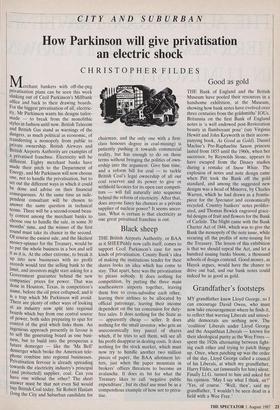CITY AND SUBURBAN
How Parkinson will give privatisation an electric shock
CHRISTOPHER FILDES
Merchant bankers with off-the-peg privatisation plans can be seen this week slinking out of Cecil Parkinson's Millbank office and back to their drawing boards. For the biggest privatisation of all, electric- ity, Mr Parkinson wants his designs tailor- made — to break from the monolithic styles in fashion until now. British Telecom and British Gas stand as warnings of the dangers, as much political as economic, of transferring a monopoly from public to private ownership. British Airways and British Airports Authority are examples of a privatised franchise. Electricity will be different. Eighty merchant banks have made their pitch to the Department of Energy, and Mr Parkinson will now choose one, not to handle the privatisation, but to set out the different ways in which it could be done and advise on their financial consequences. At the same time an inde- pendent consultant will be chosen to answer the same question in technical terms. There will be a second-round beau- ty contest among the merchant banks to choose one to handle the sale, in some 30 months' time, and the winner of the first round must take its chance in the second. Of course the easiest sale, and the likeliest money-spinner for the Treasury, would be to put the whole business in a box and sell it as it is. At the other extreme, to break it up into new businesses with no profit records would test the selling bank to the limit, and investors might start asking for a Government guarantee behind the new companies' prices for power. That was done in Houston, Texas, in competition's name, before the oil price collapsed, and it is a trap which Mr Parkinson will avoid. There are plenty of other ways of looking at an industry now split into regional boards which buy from one central source of power, both sides preparing to spar for control of the grid which links them. An ingenious approach presently in favour is to sell the generating board as one busi- ness, but to build into the prospectus a future demerger — like the 'Ma Bell' demerger which broke the American tele- phone combine into regional businesses. Privatisation fervour is already spreading towards the electricity industry's principal (and protected) supplier, coal. Can you have one without the other? The short answer must be that not even Sid would buy British Coal today. Sir Robert Haslam (long the City and Suburban candidate for chairman, and the only one with a first- class honours degree in coal-mining) is patiently pushing it towards commercial reality, but has enough to do on those terms without bringing the politics of own- ership into the argument. Give him time, and a reform bill for coal — to tackle British Coal's legal ownership of all our coal reserves and its power to give or withhold licences for its open cast competi- tors — will fall naturally into sequence behind the reform of electricity: After that, does anyone fancy his chances as a private supplier of nuclear power? It seems uncer- tain. What is certain is that electricity as one great privatised franchise is out.


















































 Previous page
Previous page